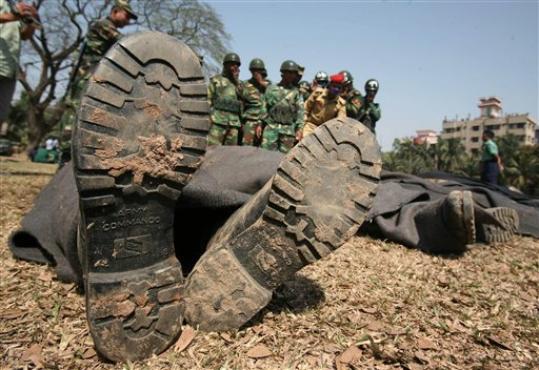
When “mutiny” is mentioned in the UK, the word usually conjures up images like the mutiny on the Bounty on the high seas. On the Indian sub-continent it is usually a reminder of the Sepoy mutiny of 1857, or rather the first war of independence as it is known to Indian nationalists. For Bangladeshis a mutiny sends alarm bells ringing, raising fears that the military have once again taken control of the country. Indeed it was in this vein that l initially responded to the news of the Bangladesh Rifles (border patrol) mutiny, coming as it did so soon after a successfully run election in December 2008 had brought back a civilian government with a huge mandate for change in the country.
As it turned out, this was a mutiny amongst the ranks against their officers over the terms and conditions of their employment, such as food rations and the opportunity to take UN assignments abroad as the army officers do. Nevertheless, the news is grim, with mass graves of officers and often their family members as well found in the heart of Dhaka, more bodies found in the sewerage system and many still missing. The mutiny also reflects the general alienation of public servants, though the lot of the Bangladesh Rifles living in a posh part of Dhaka is considerably better than that of civil servants, who have not risen up with them – nor, come to that, have other sections of the armed forces in the army and the navy. Far from being “underfunded”, as is claimed in the Guardian editorial of 2 March, the military has the best take of public resources in Bangladesh, as is the case in many other Asian countries. So to all intents and purposes it is a very localised conflict between the Bangladesh Rifles rank and file and the army officers. That has still has not stopped rumours going around that the mutiny could be party-political or even Islamist-inspired.
These past few days have been a real test for the civilian government led by Sheikh Hasina’s Awami League. Thankfully the army command has come out in support of the government, though differences exist over the promised amnesty for surrender and consideration of better terms and conditions of employment, while the army will push for the mutineers to be court marshalled – and we all know what the legal penalty for mutiny can be, though of course civilian courts too can impose the death sentence. While conflicts emerge around who has jurisdiction over the mutineers, it will all hang in the balance for a while yet, but a return to the barracks is the least we can expect.
Pingback: The Qureshi Report » MUTINEERS, ASSASSINS & WAR CRIMINALS
fears for the military.
Poor Bangladeshi they will never learn from what Pak did to them..
its horrible.. and a big tragedy for bd people
The accident of finding this post has briegthned my day